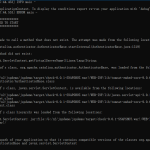velocity虽然已经为我们提供了一些资源加载器,基本已经可以满足大部分的用户需求。有的时候还需要我们必须手动去写一些,比如:我们打算采用String的模板而不是vm文件形式,为的是将模板存入db中。
这是我们只需要继承org.apache.velocity.runtime.resource.ResourceLoader 并实现我们想要的功能。
下面的例子就是拿上面的需求来进行一个简单的实现。
package cn.iigrowing.core;
import java.io.BufferedInputStream;
import java.io.File;
import java.io.FileInputStream;
import java.io.FileNotFoundException;
import java.io.IOException;
import java.io.InputStream;
import java.util.ArrayList;
import java.util.List;
import org.apache.commons.collections.ExtendedProperties;
import org.apache.velocity.exception.ResourceNotFoundException;
import org.apache.velocity.exception.VelocityException;
import org.apache.velocity.io.UnicodeInputStream;
import org.apache.velocity.runtime.resource.Resource;
import org.apache.velocity.runtime.resource.loader.ResourceLoader;
import org.apache.velocity.util.StringUtils;
public class MyResourceLoader extends ResourceLoader {
private List paths = new ArrayList();
private boolean unicode = false;
@Override
public long getLastModified(Resource arg0) {
// TODO Auto-generated method stub
return 0;
}
@Override
public InputStream getResourceStream(String templateName)
throws ResourceNotFoundException {
/*
* Make sure we have a valid templateName.
*/
if (org.apache.commons.lang.StringUtils.isEmpty(templateName)) {
/*
* If we don't get a properly formed templateName then there's not
* much we can do. So we'll forget about trying to search any more
* paths for the template.
*/
throw new ResourceNotFoundException(
"Need to specify a file name or file path!");
}
String template = StringUtils.normalizePath(templateName);
if (template == null || template.length() == 0) {
String msg = "File resource error : argument " + template
+ " contains .. and may be trying to access "
+ "content outside of template root. Rejected.";
log.error("FileResourceLoader : " + msg);
throw new ResourceNotFoundException(msg);
}
int size = paths.size();
for (int i = 0; i < size; i++) {
String path = (String) paths.get(i);
InputStream inputStream = null;
try {
inputStream = findTemplate(path, template);
} catch (IOException ioe) {
String msg = "Exception while loading Template " + template;
log.error(msg, ioe);
throw new VelocityException(msg, ioe);
}
if (inputStream != null) {
/*
* Store the path that this template came from so that we can
* check its modification time.
*/
// templatePaths.put(templateName, path);
return inputStream;
}
}
/*
* We have now searched all the paths for templates and we didn't find
* anything so throw an exception.
*/
throw new ResourceNotFoundException("FileResourceLoader : cannot find "
+ template);
}
@Override
public void init(ExtendedProperties arg0) {
// TODO Auto-generated method stub
this.paths.add("");
this.paths.add(".");
}
@Override
public boolean isSourceModified(Resource arg0) {
// TODO Auto-generated method stub
return false;
}
/**
* Try to find a template given a normalized path.
*
* @param path
* a normalized path
* @param template
* name of template to find
* @return InputStream input stream that will be parsed
*
*/
private InputStream findTemplate(final String path, final String template)
throws IOException {
try {
File file = getFile(path, template);
if (file.canRead()) {
FileInputStream fis = null;
try {
fis = new FileInputStream(file.getAbsolutePath());
if (unicode) {
UnicodeInputStream uis = null;
try {
uis = new UnicodeInputStream(fis, true);
if (log.isDebugEnabled()) {
log.debug("File Encoding for " + file + " is: "
+ uis.getEncodingFromStream());
}
return new BufferedInputStream(uis);
} catch (IOException e) {
closeQuiet(uis);
throw e;
}
} else {
return new BufferedInputStream(fis);
}
} catch (IOException e) {
closeQuiet(fis);
throw e;
}
} else {
return null;
}
} catch (FileNotFoundException fnfe) {
/*
* log and convert to a general Velocity ResourceNotFoundException
*/
return null;
}
}
private void closeQuiet(final InputStream is) {
if (is != null) {
try {
is.close();
} catch (IOException ioe) {
// Ignore
}
}
}
private File getFile(String path, String template) {
File file = null;
if ("".equals(path)) {
file = new File(template);
} else {
/*
* if a / leads off, then just nip that :)
*/
if (template.startsWith("/")) {
template = template.substring(1);
}
file = new File(path, template);
}
return file;
}
}
我们只需实现getResourceStream方法就可以了。很简单吧
应用就更简单了,基本上和我们的上一个例子没有区别
Java代码 收藏代码
package cn.iigrowing.core;
import java.io.StringWriter;
import java.util.Properties;
import org.apache.velocity.Template;
import org.apache.velocity.VelocityContext;
import org.apache.velocity.app.VelocityEngine;
public class VelocityManagerTest {
public static void main(String[] args) {
// 创建引擎
VelocityEngine ve = new VelocityEngine();
Properties p = new Properties();
p.put("resource.loader", "srl");
p.put("srl.resource.loader.class", "com.gcgchina.myjson.core.MyResourceLoader");
try {
// 进行初始化操作
ve.init(p);
// 加载模板,设定模板编码
Template t = ve.getTemplate("/aaa/hello.vm",
"gbk");
// 设置初始化数据
VelocityContext context = new VelocityContext();
context.put("name", "张三");
context.put("project", "Jakarta");
// 设置输出
StringWriter writer = new StringWriter();
// 将环境数据转化输出
t.merge(context, writer);
// 简化操作
// ve.mergeTemplate("test/velocity/simple1.vm", "gbk", context,
// writer );
System.out.println(writer.toString());
} catch (Exception e) {
e.printStackTrace();
}
}
}
主要就是 p.put("resource.loader","srl");
p.put("srl.resource.loader.class","test.velocity.MyResourceLoader");
这两行,来定义资源加载器
这样Template t=ve.getTemplate("你好 $name !\r\n$project project.","gbk");
模板中的内容我们就可以通过数据库读取出来
该实现虽然简单,不过我认为还是比较有用。




